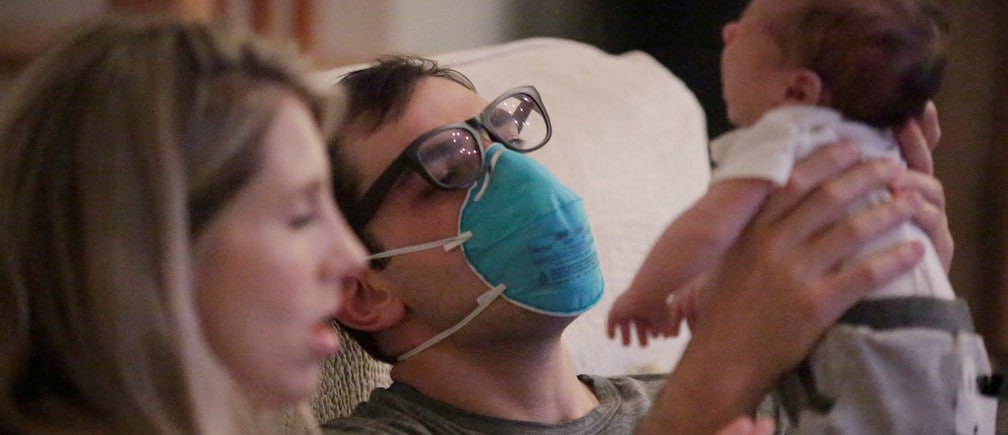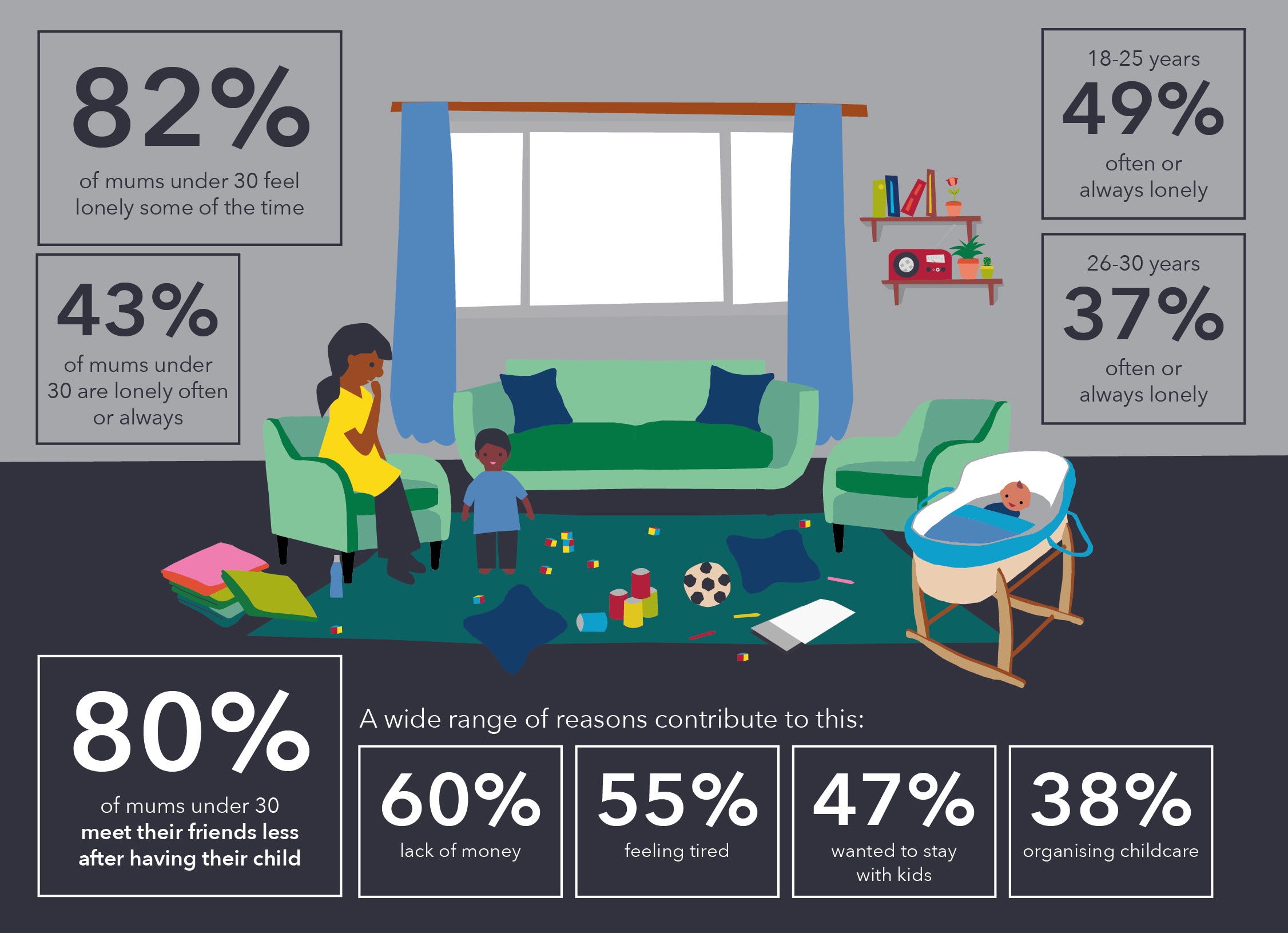How to survive the COVID-19 lockdown with a newborn baby

Family time: The pandemic is bringing new challenges to one of life's biggest milestones Image: REUTERS/Kathleen Flynn

Get involved with our crowdsourced digital platform to deliver impact at scale
Stay up to date:
Healthcare Delivery
The 10-mile trip from our home in Brooklyn to our daughter’s ophthalmologist on the Upper East Side normally takes 90 minutes by car. Two weeks ago, it took us less than half that, as we breezed along near-empty streets.
The night before, New York State Governor Andrew Cuomo had ordered most public places − bars, restaurants, cinemas, gyms − to close. One of America’s most densely populated areas was at risk of becoming the new hotspot for COVID-19, which, up until that point, had killed 6,000 and infected another 10,000 around the world. And so, the city that never sleeps was put to bed.
If we were among only a handful of people out and about at what would normally be rush hour, it was because we had no choice. Our daughter was born three months before her due date. For 53 of the 81 days she spent in a neonatal intensive care unit, she was on oxygen support, her lungs too undeveloped to work unassisted. The oxygen saved her life but it meant she was susceptible to retinopathy of prematurity, a disease that, left untreated, causes blindness. So, outfitted in masks and gloves, my husband and I ordered an Uber and made our way into Manhattan for her appointment.
Some people complained about the city shutdown; others brazenly flouted the rules. As soon as our daughter had the all-clear from the doctor − her eyes were going to be just fine, he assured us − we headed straight home. We haven’t left since.
I know that being able to hunker down for however long is needed, ordering takeout and having groceries delivered, is a sign of our privilege. But while leaving your house with a baby during a pandemic is fraught with challenges, having to stay there can be too.
“For many people, having a newborn is socially isolating anyway,” explains Jesse Pournaras, a doula in New York City. That might sound counterintuitive − how can a new addition make you feel lonelier? − but it’s in line with a 2018 survey from the British Red Cross, which found that 82% of mums under 30 have felt this way. It’s times like these, Pournaras says, that we need a support network to fall back on. “It’s useful to be able to refer to your mother, aunts, sisters and friends to ask why your body is doing what it is doing, why you feel the way you do, or what is it your baby wants when they won’t stop crying.”

When you’re forced to isolate yourself from anyone outside of your household, you lose that support system. Sure, you can ask questions over Skype − that’s something mental health experts recommend all new parents find the time to do. “People thrive with connection and social support,” says Andrea Schneider, a psychotherapist who specializes in maternal wellness. “So get teletherapy with a trained perinatal practitioner, join an online support group and stay in touch with your family virtually.”
But messaging apps are useless when what you really need is someone to hold your baby so that you can shower. “Learning how to parent can be a really tough experience,” says Pournaras. “I know many people who were relying on their families or a hired professional like a postpartum doula to help alleviate the workload and now they’re struggling to cope with it on their own.”
That’s the position in which Kim Flores and her husband Juan have found themselves. Their son, Nico, was born prematurely at the start of March and has been in hospital ever since. “Juan’s mother was supposed to be coming to stay with us for a few months to help out,” she tells me. “That won’t be happening now, because she lives in Colombia and the government has closed the borders. I’m sure my husband and I will manage, but it is nerve-wracking.”
As well as stripping mothers of their practical and mental support systems, being in lockdown limits their access to a medical one. Does the benefit of taking your baby for their first vaccines outweigh the risk of exposing yourself and your newborn to a potentially deadly virus? It was calculations like these that led to a spike in maternal mortality rates in countries affected by the 2014-2016 Ebola epidemic, according to researchers at the Liverpool School of Tropical Medicine. Sierra Leone, for example, saw a 34% increase in its maternal mortality ratio.
What is the World Economic Forum doing about the coronavirus outbreak?
“We found that there was a 22% decrease in postnatal attendance,” explains Somla Gopalakrishnan, one of the academics behind the research. “Mothers were often too scared to access medical facilities, in case they got infected. Sometimes they were even told to stay away to avoid putting extra strain on an already stretched healthcare system.”
Adequate postnatal care is one of the most important ways of protecting the health of mothers and babies, the World Health Organization has found. But when women and their newborns are forced to self-isolate, they can fall between the cracks, with sometimes disastrous consequences.
Having to go on lockdown as a new parent can trigger a sense of grief. While I’m grateful that technologies like high-speed internet and free long-distance video calls mean my parents in the UK still get to see their first granddaughter, I can’t help but feel I’ve been robbed of once-in-a-lifetime experiences I’d hoped to share with my loved ones.
But as with almost anything negative, there are a few bright spots. Here in the US, a country where many people get no paid family leave, the lockdown has created opportunities for parents to spend more time with their newborns − even if juggling both work and childcare is quite the balancing act.

“My husband has a really demanding job that requires him to travel quite a bit,” says Linara Davidson, who gave birth to her first baby, Ronald Anthony, this past November. “It’s great to have him home spending so much time with our son when we initially thought he would be away.”
Rather than focusing on the hard parts of isolation, Davidson recommends new parents make the most of this enforced hiatus to spend quality time with their baby, time they might otherwise not have had. “Be grateful you get to revel in each moment almost uninterrupted for a bit. We will get to the other side of this, and you will have a story to tell your lil’ one.”
Don't miss any update on this topic
Create a free account and access your personalized content collection with our latest publications and analyses.
License and Republishing
World Economic Forum articles may be republished in accordance with the Creative Commons Attribution-NonCommercial-NoDerivatives 4.0 International Public License, and in accordance with our Terms of Use.
The views expressed in this article are those of the author alone and not the World Economic Forum.
Related topics:
The Agenda Weekly
A weekly update of the most important issues driving the global agenda
You can unsubscribe at any time using the link in our emails. For more details, review our privacy policy.
More on Health and Healthcare SystemsSee all
Shyam Bishen
April 24, 2024
Shyam Bishen and Annika Green
April 22, 2024
Johnny Wood
April 17, 2024
Adrian Gore
April 15, 2024
Fatemeh Aminpour, Ilan Katz and Jennifer Skattebol
April 15, 2024






